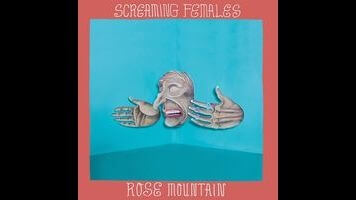Screaming Females move forward by looking back

Screaming Females are almost the Wes Anderson of rock at this point. Their albums, like Anderson’s films, are a repository of disparate influences and tropes, yet so completely appropriated into a form all their own that they become a highly idiosyncratic and singular vision, unmistakable for anyone else’s work. You know a Screaming Females song the instant you hear it. And with Rose Mountain, the band has grown up; it’s a clear continuation of the same blistering-yet-mannered rock onslaught, but the music feels like a progression—the sound of Screaming Females moving forward by looking back.
The tracks on Rose Mountain work to unseat expectations. Rather than the presumed next part, songs will often make bold deviations—not shocking (the group has never been one for simply verse-chorus-verse), but also not predictable. The title track is arguably the epitome of this—starting off with a pulsing, echoing throb reminiscent of Van Halen’s “Everybody Wants Some,” before abruptly pulling back for a theme that quietly, almost daintily plucks notes from the air like flower petals. “Ooh-ooh” melodies back up Marissa Paternoster’s plaintive sing-song. They’ve stopped trying to replicate the live Females experience on record—recording with Steve Albini is likely the closest they’ll ever get to that goal—and instead started trying something else: a Females album that becomes an experience unto itself.
Playing guess-the-influence has always been part of the fun, and the band embraces classic pop hooks and structures in some of its most overt ways yet. It’s a broad palette: There are ’50s-style swing moments and ’60s pop-rock nuggets amid the heavy dollop of rock swagger the band has always employed. “It’s Not Fair” is practically stately, and barely a minute long. “Hopeless” employs organ sounds to create an old-fashioned farewell jam: “Don’t count on me again / I’ll obsess on our encounters / I want us to be friends.” It’s pretty and pained.
That’s not to say it’s a radical departure—the album still kicks and seethes with the jagged riffs and hollering vocals that have defined Screaming Females. “Ripe” and “Burning Car” both fume and fuss; “Triumph,” a bass-driven thumper, draws on classic-rock stylings before launching into its chorus. It’s a fusion of everything the band does best: a slick, jaunty rhythm, sharp lyrics that feel intimate even when they’re abstract, and a bridge that journeys far afield of the initial riff, into Zeppelin territory, before crashing back into its signature sound. “Criminal Image” closes the record with a riff and rhythm that could be pulled from late-’70s Southern groove-rock bands. Bad Company analogies wouldn’t be out of place—but neither would references to Soundgarden.
Comparisons of Paternoster’s vocals to those of Sleater-Kinney’s Corin Tucker are understandable—they both howl with a wistful vibrato that can blow doors off hinges. However, less acknowledged is the bold theatricality that Paternoster often infuses into her vocals. Her shouts and wails are layered with elements of showmanship and the demeanor of a sassy carnival barker that harks back to other great punk frontwomen, like Lunachicks’ Theo Kogan, or—reaching even further back—someone like David Lee Roth. It’s one of the things that has always set the band apart: the fusion of open-hearted passion and let’s-put-on-a-show dramatics, with equal mastery of both. And with their new album, Screaming Females have evolved by delving even deeper into their influences, resulting in an album that, surprisingly enough, would fit the description of refined. It may not be their best—it’ll be hard to top Ugly—but it’s taking steps in a new direction, and positioning the band for even greater things to come.